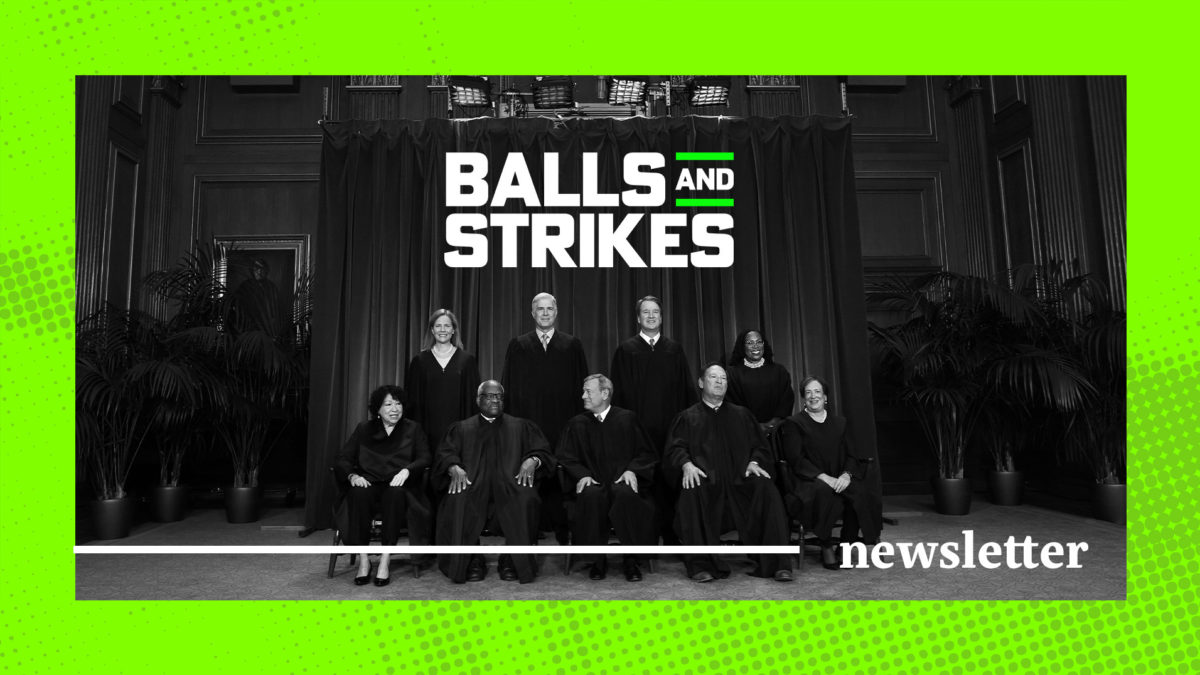Last week, the Supreme Court released a 20-page report detailing the results of its “investigation” into the leak of the draft opinion in Dobbs v. Jackson Women’s Health Organization in May. Although the Supreme Court Marshal’s office followed up on “all available leads,” the justices wrote, it was “unable to identify a person responsible.” The leak, which the report calls an “extraordinary betrayal of trust” and a “grave assault on the judicial process,” will remain, for the time being, unresolved.
But this characterization of the inquiry’s as thorough is, to put it generously, generous. The report makes clear that the Marshal “focused” on staffers with access to the draft, including “temporary (law clerks) and permanent employees.” Dozens of them had to sign sworn affidavits, under penalty of perjury, disclaiming responsibility for the leak. Their legal research histories were examined; so were their contacts with reporters, especially with reporters at Politico, which published the draft. Some even had their phone records searched.
By contrast, the justices and their spouses—some of whom have histories of allegedly leaking opinions and/or powerful motivations to do so here—got the kid-gloves treatment: Although the Marshal “spoke with” each justice, she said, she “did not believe that it was necessary” to ask them to sign affidavits. This is a little like Sherlock Holmes getting hired to solve a murder at a hotel co-managed by Freddy Krueger and Jason Vorhees, and upon his arrival, asking them which guest rooms he should search first.
Today, though, I want to focus on a less important but equally hilarious takeaway from the report: the revelation that the Supreme Court—ostensibly a sacrosanct temple of justice presided over by the country’s nine sharpest legal minds—apparently relies on an IT infrastructure cobbled together with toothpicks and chewing gum during the Reagan administration.
The biggest takeaway from the Dobbs leak report that doesn’t involve my speculation is that Supreme Court IT is trapped in, like, 1993. It’s hard to say the investigation “failed” when investigators can’t even determine whether anyone…emailed the draft https://t.co/uhb3WJoc7Q pic.twitter.com/1s1c17q0gA
— Jay Willis (@jaywillis) January 19, 2023
Although investigators uncovered no evidence that anyone emailed the draft to an unauthorized party, the report notes that “technical limitations in the Court’s computer recordkeeping at the time make it impossible to rule out this possibility entirely.” They can’t know for sure who accessed digital versions of the draft, because the system “lacked substantial logging and search functions.” The possibility that someone downloaded the draft to a thumb drive—as plausible a method as any for leaking a document to a journalist—is unfortunately deemed “impossible to rule out.”
Maybe the funniest section of the report is its sheepish description of the Court’s printer ecosystem. Shared printers had “very little logging capability at the time,” it says; as a result, “many print jobs were simply not captured.” Investigators also found 46 local printers (!!) that, because they weren’t attached to the building’s network, were capable of logging even fewer jobs in their histories. In other words, if someone used one of these dozens of offline printers to score an extra hard copy of the Dobbs draft that they could then hand to a Politico reporter in a dimly-lit Rosslyn garage, any record thereof would have disappeared long ago. (Some of these local printers, the report notes, are assigned to the justices’ chambers. Probably a coincidence.)
Obviously, the Court faces more serious problems than its reliance on a Windows 95-ass computer network. (I would argue that “being controlled by a supermajority of right-wing weirdos whose views are significantly out of step with the American public” is chief among them.) And I don’t envy anyone who has to teach two-factor authentication to cantankerous septuagenarians, much less to literally Samuel Alito. But if, say, some arm of the executive branch were riddled with this many self-inflicted security holes, people would be losing their shit right now. It’s hard to say the Court’s investigation “failed” to identify the leaker when the people in charge can’t even figure out if anyone emailed anyone else an illicit PDF.
The Court’s cartoonishly shambolic IT is emblematic of the institution’s unfailing belief in its ability to regulate itself, despite all available evidence to the contrary. It is also a tidy illustration of why Supreme Court leaks are good: because every glimpse behind the curtain further exposes the institution as an embarrassing farce that does not deserve the reverence it demands. After reading this report, I am more confident than ever that at least one Supreme Court justice has wired money to a deposed Nigerian prince pleading for help getting his wealth out of the country. I am also confident that they’ll do it again when asked.
As always, you can find us at ballsandstrikes.org, or follow us on Twitter at @ballsstrikes, or get in touch via [email protected]. Thanks for reading.
This Week In Balls & Strikes
Supreme Court Denies Appeal Of Man Whose Court-Appointed Lawyer Ghosted Him, Yvette Borja
Does your court-appointed lawyer have to actually show up to court? Not necessarily, says the Supreme Court!
Put a Public Defender on the Ninth Circuit, Kara Hartzler
The nation’s largest appeals court has gone 140 years without a public defender on the bench.
Terence Andrus Deserved Better Than What the Supreme Court Gave Him, Yvette Borja
His death by suicide in a Texas prison is the product of a legal system that failed him at every turn.
This Week In Other Stuff We Appreciated
SCOTUS’ First Decision Of the Term Is a Unanimous Blow to Disabled Veterans, Mark Joseph Stern, Slate
A baffling endorsement of the bureaucratic hell that disabled vets face.
Trump’s Worst Judge Is Now a Dangerous Threat to Press Freedom, Ian Millhiser, Vox
Reactionary freaks have a failsafe way to not get thrown out of court: Stay close to a reactionary freak’s courtroom.
Does Kathy Hochul Really Want to Go Down With Hector LaSalle’s Sinking Ship?, Elie Mystal, The Nation
The governor’s meltdown over the rejection of her conservative judicial nominee continues apace.
This Week In Obscure Photos of Supreme Court Justices On Getty Images


